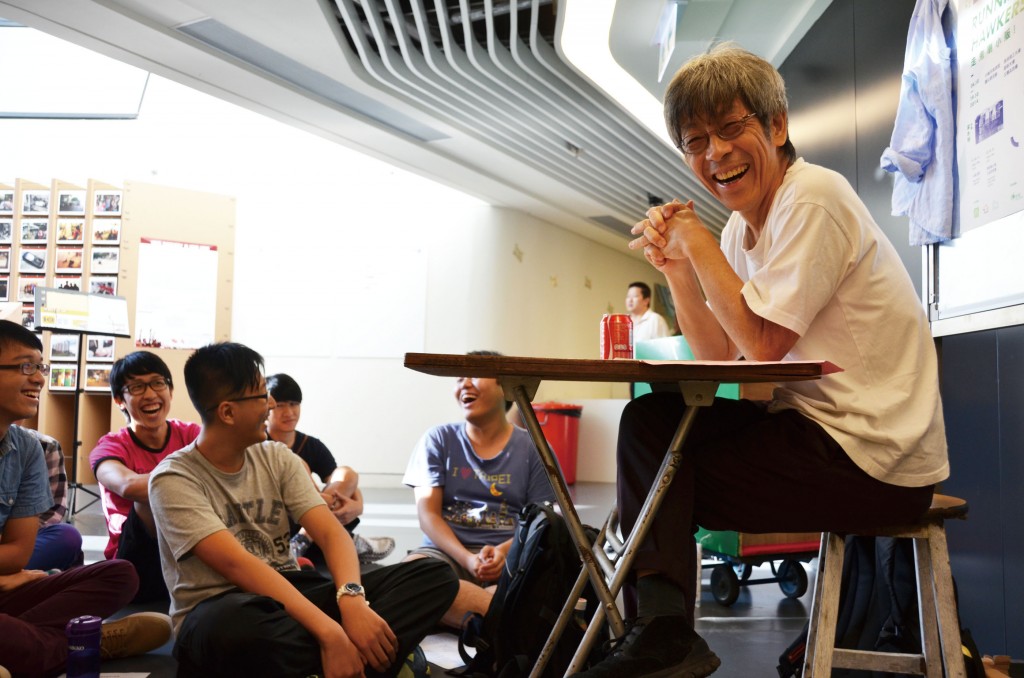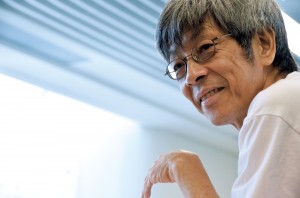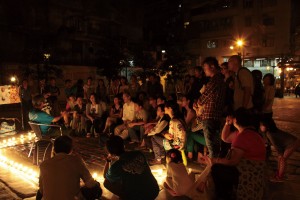How telling stories healed activist Yuen Che-hung’s soul
By Donna Shiu
A small, slight man with a mop of grey hair is walking along a running track as a train in the middle distance approaches fast. He feels the onrush of the locomotive and, when it surges past, it seems as if it is taking his wrinkles away as it speeds off into the night. The man is 62-year-old storyteller Yuen Che-hung, better known as Uncle Hung, and he is describing a scene and an emotion he experienced on his way to his interview with Varsity. It may very well appear later in one of Yuen’s stories, if it has not done so already.
“My innate ability is to find stories,” Yuen says. He has felt a strong urge to express himself since he was a child but was not always brave enough to speak his mind. The first stories were told under his blanket, where he played multiple roles in his heroic tales. But he never expected he could turn his storytelling talent into a career that has lasted for more than two decades.
Before becoming a full-time storyteller, Yuen had a number of different jobs. He taught English at a secondary school, worked in the publishing unit of a kindergarten and for the theatre education team of the Chung Ying Theatre Company. It was while working for the theatre company that he discovered his interest in storytelling.
As a storyteller, Yuen goes to different schools to tell stories on request. In his work, he comes across many children and parents. Some of these parents insist the value of storytelling lies in how much the stories can teach children. Yuen believes this is a misconception. He responds by asking them when children start to read. “Babies start to read from birth,” Yuen says. “When they open their eyes, the world is a book … Kids saying they know nothing actually know more than adults.”
Yuen thinks stories help children to learn about the world through stimulating and stirring up their curiosity. He refuses to tell stories that urge children to act in a certain way which are very popular in Chinese societies. “When you want to exhort children [to behave] with a story, the story is fading. Children can only remember the exhortation,” he says.
Yuen’s educational philosophy is to let the world speak for itself. It is a parenting style he learnt from his father. Yuen’s father always supported his choices, something that allowed his son to be a life-long dreamer. When Yuen was in Secondary Six in 1971, he was swept up in the active student movement of the time – enlightened by books of existentialist philosophy and listening to the songs of Bob Dylan and Simon and Garfunkel.
He says these western cultural products encouraged him to question his life. He began to publish political magazines at school, get involved in political activism and ended up getting expelled. Later, he joined the radical group Avant Guard Bookshop and urged the public not to pay their rent, water bills, electricity bills and phone bills in protest against the government’s increase in public housing rent despite the economic downturn caused by the oil crisis. The activists also went to industrial areas like San Po Kong to ask the workers there to occupy the factories.
One time, Yuen bumped into his father – who was a garment worker in the area – while he was distributing leaflets. His father did not know Yuen was involved in the protests, but he did not get angry at his son. Instead, he raised concerns from the practical perspective of a worker. They already worked more than 10 hours a day, said Yuen’s father. If they occupied factories, they would spend 24 hours there. It would be hard to get workers’ support for the action. Yuen could not hide his disappointment. Still, the older Yuen promised to discuss the idea with his colleagues.
In the end, Yuen was arrested during the protest and his father attended the court hearing. The magistrate ordered him to be bound over. But Yuen’s father never wavered in his support or stopped his son from doing anything. “My dad encouraged me a lot,” Yuen recalls. “In fact I am hesitant to make any decisions. Yet I at last persuaded people to occupy factories despite the risk of being kicked out from school.”
After that, he threw himself into a “people’s theatre” group, acting in street dramas to spread political messages. Yuen longs for an anarchist society governed by the people. “I am not fighting for rights but the decentralization of rights,” Yuen says of his ideal political world. But soon he figured out that he was not suited to the role. “The louder I shout a slogan, the more powerless I feel,” he says.
Yuen went through a dark period in his 30s when he suffered ill health and felt lost and depressed. He says the power of stories and the wisdom of children helped to heal him. That, and the constant support of his father.
Yuen is now the father of an 18-year-old son. When his son was young, bedtimes were special times for stories. It was through these stories that the grandson became familiar with the grandfather he never really knew in person because he passed away when the boy was very young. Yuen told his son about how his own father had taken him to the LaiChiKokAmusement Park. How he stood facing the merry-go-round, and waved whenever the boy made eye-contact as he went round.
As a storyteller, Yuen highlights the relationship between imagination and society. He tries hard to explore the space for interpersonal interaction. For him, the Umbrella Movement, in which protesters have been occupying areas of Admiralty, Mong Kok and CausewayBay to fight for genuine universal suffrage, has succeeded in opening such a space.
“This is a Utopia,” Yuen says, adding that people can now go for a walk, have a chat, or make and eat some snacks on the street. It has broadened people’s imagination of what life can be like. Yuen would say imagination tells people life can be different. For example, Hong Kong has long suffered from air pollution. Yuen sees an occupied site and imagines a giant who hates cars on the road snatching them away to cleanse the polluted air. This may seem fantastical but it coheres strangely with the improved air quality in the occupied areas.

He sees other stories and connections in fragments of remembered details. When the Hung Hom Cross-Harbour Tunnel started operating in 1972, there were news reports about an old man who walked through the tunnel and was fined because the tunnel was only for vehicles. Yuen takes on the story from there – the man argues that a tunnel is designed to let people go from one end to another and this echoes what is happening in Hong Kong today. “Occupiers seem to block the traffic. But they tell us we can walk from one side to the other in life,” Yuen says. He says it is the government that is blocking society’s arteries and making peoples’ lives difficult.
Yuen has the insight and vision to make his fictional stories come alive. He shares the essence of a good story – creation is about building imagination over observation of reality. “The way to make jam rigid is to spread it on a slice of bread,” he explains. The bread is reality and jam is imagination.
Passers-by always walk into Yuen’s stories. For instance, he is inspired when he sees a middle-aged man on the MTR wearing two watches. Yuen strikes up an imaginary conversation with this man. The man tells him his little daughter suggested he wear an extra watch to gain more time. It takes a long time to build a factory so workers produce watches to compensate for the time lost. Yuen asks the man if the strategy is effective. The man answers, “It is, otherwise why I would talk to a stranger for so long?”
“Creating stories is using a brand new perspective to view the some routines. Create a new space for yourself,” Yuen says, “I don’t create stories. Stories come to me. They have life.”
Edited by Tracy Chan










































